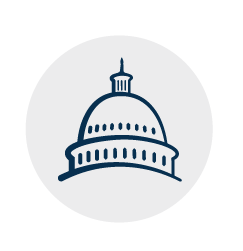Administration Releases FY 2024 Budget; $28.2 Billion LIHTC Package Included
On March 9, 2023, President Biden sent his $6.9 trillion FY 2024 Budget to Capitol Hill. The President’s Budget is not binding on Congress but does indicate the Administration’s spending and revenue priorities for the year – including a commitment to address the affordable housing shortage by expanding and enhancing the Low-Income Housing Tax Credit.
Specifically, the Budget increases the annual credit dollar amounts (ACDAs) to $4.25 per capita in 2024 and to $4.88 in 2025. For 2026 and subsequent years, the ACDAs would be the amount for the prior year, indexed for inflation. The Budget also includes a key industry priority that reduces the bond financing requirement from 50 percent to 25 percent on a permanent basis. The proposal applies to buildings placed in service in taxable years beginning after December 31, 2023. The $28.2 billion LIHTC package also repeals the qualified contract provision from the date of enactment, and repeals the ROFR safe harbor provision, replacing it with an option safe harbor. The President’s Budget includes a neighborhood homes tax credit and makes permanent the New Markets Tax Credit.
The President’s blueprint calls for a number of revenue raisers, including, among others, a 25 percent minimum tax on households worth more than $100 million, an increase in the corporate tax rate from 21 percent to 28 percent, an increase in the top individual income tax rate to 39.6 percent for those making over $400,000, an increase in the stock buybacks excise tax from 1 percent to 4 percent, an increase in the capital gains rate from 20 percent to 39.6 percent for those earning at least $1 million, the elimination of the carried interest tax break, and the elimination of the like-kind exchange tax break. The Treasury Department’s so-called Green Book contains detailed descriptions of the revenue proposals in the Biden Budget, and also includes revenue estimates for the tax proposals.
On the spending side of the ledger, the Budget includes a robust affordable housing agenda to address the supply shortage. It also includes $10 billion in mandatory funding to incentivize state, local and regional jurisdictions to make progress in removing barriers to affordable housing developments, such as restrictive zoning. Other housing and community development highlights include the following:
· $51 billion in additional Low-Income Housing Tax Credits, a new Neighborhood Homes Tax Credit, and mandatory funding for new project-based rental assistance contracts.
· $7.5 billion for Project-Based Rental Assistance funding.
· $3.2 billion for Public Housing Fund modernization, $300 million to improve the energy efficiency, climate resilience, and physical condition of the Public Housing stock, and $7.5 billion in mandatory funding for comprehensive modernization of targeted Public Housing communities.
· $3.4 billion for the Community Development Block Grant Program (CDGB).
· $1.8 billion for the HOME Investment Partnerships Program (a $300 million increase from 2023).
· $100 million for a HOME down payment assistance pilot for first-generation and/or low wealth first-time homebuyers.
· $32.7 billion for the Housing Choice Voucher Program (a $2.4 billion increase from 2023).
· $10 million for the Eviction Protection Grant program.
· $3.7 billion to prevent and reduce homelessness with Homeless Assistance Grants (a $116 million increase from 2023).
· $258 million to support 2,200 units of permanently affordable housing for the elderly and persons with disabilities.
· $505 million for Housing Opportunities for Persons with AIDS.
· $1 billion for Native American Programs to expand affordable housing, improve housing conditions and infrastructure, and increase economic opportunities for low-income families.
· $410 million for states, local governments, and nonprofits to reduce lead-based paint and other health hazards in the homes of low-income families, $25 million for the Office of Lead Hazard Control and Healthy Homes, and $60 million to prevent and mitigate housing-related health hazards in HUD-assisted housing.
· $150 million for activities that advance resilience and energy efficiency in housing-related projects.
· $90 million for state and local fair housing enforcement organizations and to further education, outreach, and training on rights and responsibilities under federal fair housing laws.
For next steps, the House Budget Committee is expected to hold hearings and begin work on its own budget. Other committees will hold hearings on programs under their jurisdiction. On March 10th, Treasury Secretary Janet Yellen will testify before the House Ways and Means Committee.
We wanted to update you on the status of reintroduction of the Affordable Housing Credit Improvement Act. We are continuing to work with our Hill champions and industry partners as they review the AHCIA for potential additions or modifications. In that regard, we are pleased to report that Senator Marsha Blackburn (R-TN) will join Senators Maria Cantwell (D-WA), Ron Wyden (D-OR), and Todd Young (R-IN) as a key champion of the AHCIA. On the House side, Rep. Darin LaHood (R-IL) will join Reps. Suzan DelBene (D-WA), Don Beyer (D-VA) and Brad Wenstrup (R-OH) to champion the legislation.
We also want to remind you to mark your calendar for our May 17-18, 2023 Affordable Housing Symposium and Hill visits. We are again partnering with our AHTCC colleagues on this event, and we hope to see you in D.C.

